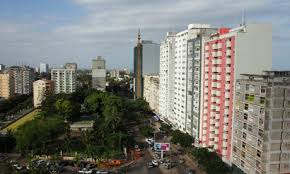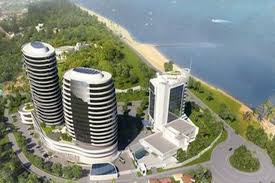 Cranes tower over
buildings across Maputo, from new office blocks to a huge Chinese-owned five
star hotel. Industrial drills and grinders add to the cacophony emanating from
the city’s increasingly traffic-clogged streets.The capital of Mozambique bears
all the hallmarks of a city in the throes of a boom. But beneath the surface
is an economy under stress, hit by the collapse in commodity prices and global
economic volatility that is blighting some of Africa’s brightest prospects.“It
will be tough,” says Salimo Abdula, a prominent businessman, bemoaning the
recent marked slowdown in economic activity.For much of the past decade,
Mozambique has been one of the continent’s hottest investment destinations,
largely due to the discovery by oil companies Anadarko and ENI of vast offshore
gasfields with the potential to bring in billions of dollars of investment and
transform one of the world’s least developed nations into one of its top producers
of liquefied natural gas.But just as the slump in oil and metal prices has hit
Africa’s top commodity exporters, from Nigeria to Zambia, it is hurting poorer
nations hoping to be among the next generation of commodity exporters.
Cranes tower over
buildings across Maputo, from new office blocks to a huge Chinese-owned five
star hotel. Industrial drills and grinders add to the cacophony emanating from
the city’s increasingly traffic-clogged streets.The capital of Mozambique bears
all the hallmarks of a city in the throes of a boom. But beneath the surface
is an economy under stress, hit by the collapse in commodity prices and global
economic volatility that is blighting some of Africa’s brightest prospects.“It
will be tough,” says Salimo Abdula, a prominent businessman, bemoaning the
recent marked slowdown in economic activity.For much of the past decade,
Mozambique has been one of the continent’s hottest investment destinations,
largely due to the discovery by oil companies Anadarko and ENI of vast offshore
gasfields with the potential to bring in billions of dollars of investment and
transform one of the world’s least developed nations into one of its top producers
of liquefied natural gas.But just as the slump in oil and metal prices has hit
Africa’s top commodity exporters, from Nigeria to Zambia, it is hurting poorer
nations hoping to be among the next generation of commodity exporters.
 The
trend is radically altering the narrative of the Africa growth story — one of
the few bright spots in the global economy in recent years.Illustrating the
travails Mozambique faces, the International Monetary Fund last week announced
it had agreed to loan the government $286m. It still forecasts growth of 6.3
per cent for Mozambique this year — far healthier than its estimate of 3.75 per
cent for sub-Saharan Africa but markedly less than the country has been used to.“Mozambique
is currently experiencing an external shock associated with the drop in
commodity prices, lower growth in trading partners, and delays in investment
associated with large natural resource projects,” the IMF said.The country’s
annual growth rates have been in excess of 7 per cent in recent years, and the
congested streets of Maputo pay testament to the trickle-down effects for the
city’s small but growing middle class — the number of vehicles imported
annually has nearly trebled to more than 52,000 over the last decade.
The
trend is radically altering the narrative of the Africa growth story — one of
the few bright spots in the global economy in recent years.Illustrating the
travails Mozambique faces, the International Monetary Fund last week announced
it had agreed to loan the government $286m. It still forecasts growth of 6.3
per cent for Mozambique this year — far healthier than its estimate of 3.75 per
cent for sub-Saharan Africa but markedly less than the country has been used to.“Mozambique
is currently experiencing an external shock associated with the drop in
commodity prices, lower growth in trading partners, and delays in investment
associated with large natural resource projects,” the IMF said.The country’s
annual growth rates have been in excess of 7 per cent in recent years, and the
congested streets of Maputo pay testament to the trickle-down effects for the
city’s small but growing middle class — the number of vehicles imported
annually has nearly trebled to more than 52,000 over the last decade.
 The
consortiums led by Anadarko and ENI were expected to announce their final
investment decisions on the gas projects this year, but these are now expected
to be delayed until 2016. A nascent coal sector has been hit by infrastructure
bottlenecks and falling coal prices.The impact of the economic slowdown has
been particularly conspicuous in the construction and real estate sectors that
were driving Maputo’s boom.
The
consortiums led by Anadarko and ENI were expected to announce their final
investment decisions on the gas projects this year, but these are now expected
to be delayed until 2016. A nascent coal sector has been hit by infrastructure
bottlenecks and falling coal prices.The impact of the economic slowdown has
been particularly conspicuous in the construction and real estate sectors that
were driving Maputo’s boom.
“Suddenly foreign
investment is decreasing [and] the state is highly in debt,” says Andre Vilas
Boas, country manager of Soares da Costa, a Portuguese construction company.
“We are in an economy with no liquidity and we are waiting.”
Although bankers and
businessmen say they are optimistic that the economy will rebound, the country
faces a number of challenges.Like other emerging market currencies, the metical
has depreciated sharply this year, falling about 30 per cent against the US
dollar, hurting importers in a nation dependent on goods from abroad. The
government’s foreign reserves have shrunk by a quarter to $2.3bn and it is
battling a budget deficit that hit 10.4 per cent of gross domestic product last
year.Mr Abdula, head of Intelec Holdings, which has interests in a variety of
sectors, says a slowdown in government spending and increasing delays in its
payment of bills is having a ripple effect across industry.“If they pay, they
pay very slowly, but it affects all the systems because it’s like a cascade,”
says Mr Abdula.
 “Many of the companies have faced this cash flow [problem]; I
don’t know how long they can hold.”Domestic factors also play a role in the
changing outlook. The government’s decision two years ago to back a
controversial $850m bond to set up a tuna fishing company has left it
responsible for $500m of the company’s debt, heaping additional pressure on its
meagre resources.Businesses are also grappling with a shortage of dollars.
Imports have continued to grow at 17 per cent year-on-year but exports have
stagnated.The knock-on effect is visible around the capital. Hotels that were
until recently enjoying 90 per cent or higher occupancy rates are now around
half full; rents and property prices have tumbled.“It’s difficult for some
developers to fund the buildings.
“Many of the companies have faced this cash flow [problem]; I
don’t know how long they can hold.”Domestic factors also play a role in the
changing outlook. The government’s decision two years ago to back a
controversial $850m bond to set up a tuna fishing company has left it
responsible for $500m of the company’s debt, heaping additional pressure on its
meagre resources.Businesses are also grappling with a shortage of dollars.
Imports have continued to grow at 17 per cent year-on-year but exports have
stagnated.The knock-on effect is visible around the capital. Hotels that were
until recently enjoying 90 per cent or higher occupancy rates are now around
half full; rents and property prices have tumbled.“It’s difficult for some
developers to fund the buildings.
 Previously you could secure 70 per cent
off-plan, now you can secure 5-10 per cent off plan,” says Adrian Frey, the
Mozambique head of real estate group Pam Golding. “It’s an important learning
curve for Mozambique that it’s not always going to go up.”Few doubt the gas
projects will proceed eventually and executives remain optimistic about
Mozambique’s potential, but for now the hype of recent years has been replaced
by a degree of uncertainty.“We believe it’s a question of time,” says Ismael
Faquir, country head of Ernst & Young. “But of course looking at the price
of commodities, everyone is worried because we started the discoveries when the
price of oil and commodities was high, and today everything that we have has
had a significant decrease in price.”
Previously you could secure 70 per cent
off-plan, now you can secure 5-10 per cent off plan,” says Adrian Frey, the
Mozambique head of real estate group Pam Golding. “It’s an important learning
curve for Mozambique that it’s not always going to go up.”Few doubt the gas
projects will proceed eventually and executives remain optimistic about
Mozambique’s potential, but for now the hype of recent years has been replaced
by a degree of uncertainty.“We believe it’s a question of time,” says Ismael
Faquir, country head of Ernst & Young. “But of course looking at the price
of commodities, everyone is worried because we started the discoveries when the
price of oil and commodities was high, and today everything that we have has
had a significant decrease in price.”
1 comentários:
Partagez de bonnes informations sur votre blog, Blog vraiment utile pour nous. Famille D'accueil Dublin
Post a Comment